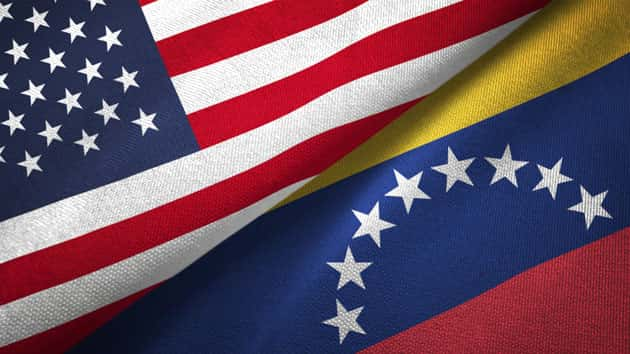
Oleksii Liskonih/iStock
Oleksii Liskonih/iStock(WASHINGTON) — The Trump administration sanctioned a division of Russia’s powerful state-owned oil company for facilitating Venezuelan exports in a bid to increase pressure on the government of Nicolás Maduro and push him from power.
The move is a significant step in trying to sever Moscow’s support for Maduro and dry up funding for his government. But after more than a year of intensifying economic pressure, the strongman leader who has overseen an economic and humanitarian crisis and seized political power shows no signs of leaving, according to U.S. officials.
These sanctions target Rosneft Trading Company, an oil brokerage firm that handles 70% of Venezuela’s oil exports, according to U.S. Special Envoy for Venezuela Eliot Abrams, along with its president. Already under a U.S. embargo, those oil exports have kept Maduro afloat financially and politically, giving him funds to pay the military and security forces.
Senior U.S. officials said they would be the first of many new steps in 2020 to expand a “maximum pressure” campaign against Maduro and increase the cost for Russia to continue supporting him — a step that Venezuela’s opposition had been urging the administration to take.
“There will be more steps and further pressure in the coming weeks and months,” Abrams said during a briefing at the State Department on Tuesday.
While he said no individual action will bring an end to Maduro’s control, he added that it’s “a very significant step, and I think you will see companies all over the world in the oil sector now move away from dealing with Rosneft Trading.”
Since January 2019, the U.S. has declared Maduro illegitimate and instead recognized the leader of the opposition-controlled National Assembly Juan Guaidó as Venezuela’s legitimate president, along with nearly 60 other countries.
Venezuela has been gripped by a humanitarian crisis for years now, with food and medical shortages, over 3 million refugees fleeing its borders and sky-high inflation after years of economic mismanagement and corruption under Maduro.
Guaidó returned to Caracas last week after visiting Europe, Canada and the U.S., where he was one of President Donald Trump’s honored guests at the State of the Union address. While he was able to get back into the country safely, supporters welcoming him at the airport were harassed, and his uncle Juan Jose Marquez was arrested and charged with smuggling explosives on the flight — an allegation that the airline TAP Air Portugal and Portugal’s foreign minister said was impossible.
That tour of western support rattled Maduro’s government, according to Abrams, who said it believed support for the opposition leader was beginning to fade.
Guaidó’s envoy in Washington, Ambassador Carlos Vecchio, welcomed Tuesday’s announcement, saying, “Russia, using Rosneft, has looted our wealth for its benefit and at the expense of the suffering of the Venezuelan people. … With the support of our allies, we are cutting the oxygen to the dictatorship, and we are going to liberate Venezuela.”
But after a year of economic and diplomatic pressure, Maduro’s government has still given “no indication yet that they’re seriously contemplating allowing” free and fair presidential elections, Abrams said — one path the U.S. has offered out of its pressure campaign.
Sanctions on the oil firm will take effect after a 90-day wind down period and apply to any transaction by the company, not just those related to Venezuela’s oil.
Analysts say it will make it harder for Venezuela to export its oil and make Maduro more reliant on black market sales — meaning selling at a larger discount and earning less while making it legally harder and more expensive for countries to buy it, including India and China, Venezuela’s two largest oil buyers, according to Abrams.
Secretary of State Mike Pompeo informed his Russian counterpart, Sergei Lavrov, of the Rosneft decision on Friday when they met in Munich, Abrams said.
Abrams wouldn’t detail Lavrov’s response, beyond that he “heard the message.” But just 10 days ago, the Russian foreign minister made a high-profile visit to Caracas and promised to deepen Russian economic and military cooperation with Maduro’s government, including increased investment.
A senior administration official said Tuesday the U.S. is only at 50-60% of its “maximum pressure” and is preparing to go further.
Asked whether the U.S. would use any covert or military action against Maduro’s government, they said only, “We do not discuss internal deliberations. The president has made clear over and over again that all options are on the table.”
Copyright © 2020, ABC Audio. All rights reserved.